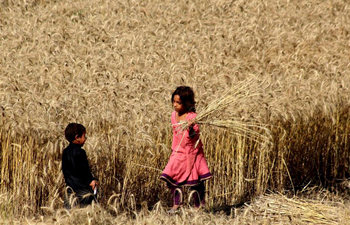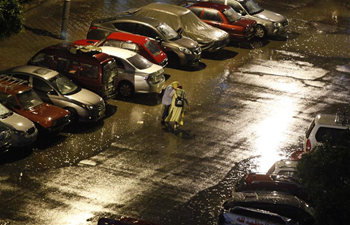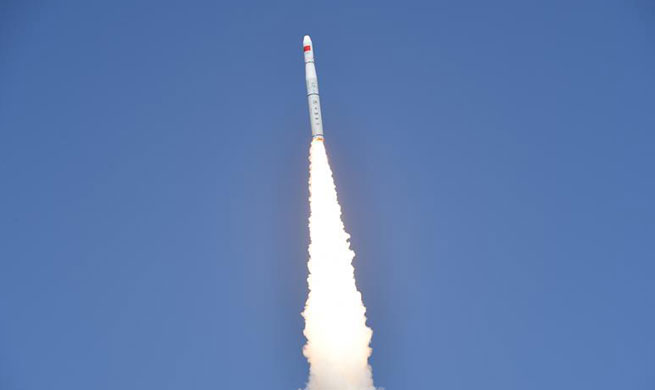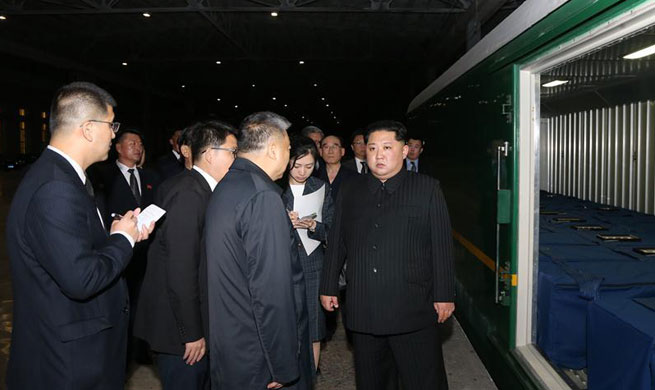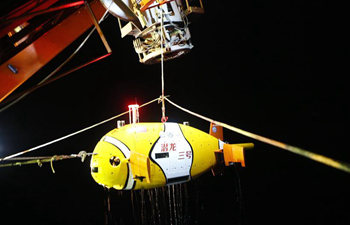by Jamal Hashim, Shaalan Ahmed
BAGHDAD, April 26 (Xinhua) -- Iraq's recent spate of airstrikes targeting positions of Islamic State (IS) militants inside neighboring Syria has raised questions about Iraq's motives weeks ahead of its parliamentary elections.
In the latest preemptive airstrikes on April 19, Iraqi F-16 fighter jets killed 36 IS militants, including five of the group's leaders.
On Tuesday, Iraqi Prime Minister Haider al-Abadi pronounced in a statement his country's determination to "pursue Daesh (IS) militants anywhere," including its remnants in Syria.
"We will continue airstrikes in Syria and we will do more to eliminate Daesh. We will not allow IS militants to come back, or establish a similar thing," Abadi said.
The ongoing conflict in Syria has given a breathing chance for IS militants near the country's eastern border with Iraq, he noted.
When asked about the real motives of Iraqi airstrikes inside Syria, Nadhim al-Jubouri, an Iraqi political analyst, told Xinhua that several reasons are believed to be behind these attacks.
The first reason is that the Iraqi leaders have long worried about the spillover effects of the internal conflict in neighboring Syria.
Despite a declaration of full liberation from the IS after three years of fierce battles with the extremist group, Iraq is still fighting sporadic clashes with its remnants in rugged areas, who have been carrying out attacks against security forces and civilians.
Nearly seven years into the Syrian civil war, the Arab country has turned into a proxy battleground for regional and international powers.
The presence of extremist militant groups, including the IS, in western Syria, prompted the Iraqi government to send security forces and paramilitary Hashd Shaabi brigades to protect its border areas from these groups.
"Not only Daesh, there are also other groups that Iraq would not accept their presence near the borderline with Syria, such as the Kurdish People's Protection Units, the Sunni extremist al-Nusra Front and other militias out of the control of the Syrian government," Jubouri said.
The borderline between Iraq and Syria, which extends some 600 km west of the provinces of Nineveh and Anbar, has long been used by insurgents and IS militants for logistic support and to carry out cross-border attacks in Iraq since the U.S.-led invasion in 2003.
Another reason behind Iraq's airstrikes, observers believe, concerns Abadi's ambition for a second term as prime minister in the upcoming elections.
Iraq will hold the parliamentary elections on May 12, the first of its kind since the defeat of the IS, where 6,986 candidates are expected to compete for 329 parliamentary seats to form a new government which will rule Iraq for the next four years.
The airstrikes are seen as an attempt to regain Iraq's former role as a military power in the region, Sheikh noted.
"Such influential regional role is an exciting idea to the people of Iraq that would certainly benefits Abadi, who wants to show himself as a powerful leader in his competition for another term in the upcoming elections," Sheikh said.
With close relations with Iran and Russia, the main allies of Syrian President Bashar al-Assad, as well as strong ties with the U.S., Iraq is obliged to coordinate with all concerned parties in the Syrian conflict, according to Sabah al-Sheikh, also a political analyst.
"The airstrikes were planned and executed by the warplanes of the Iraqi Joint Operations Command (JOC) with intelligence support from the U.S.-led coalition," Sheikh said.
Iraq also informed the Syrian side of the airstrikes, he added.
Salih al-Faiyadh, Iraq's national security advisor, also confirmed that the airstrikes came after coordination with Syria.
"We are keen to fight Daesh and we don't have an invisible agenda, as we had coordinated with the Syrian government before conducting the airstrikes," Faiyadh said.
Moreover, Sheikh said the Iraqi airstrikes could be beginning of the new Middle East policy of U.S. President Donald Trump who wants the regional countries to fight more on their own.
On Wednesday, Trump said at a joint news conference with French President Emmanuel Macron that some "immensely wealthy" countries in the Middle East have to pay for American protection and deploy their troops in Syria.







